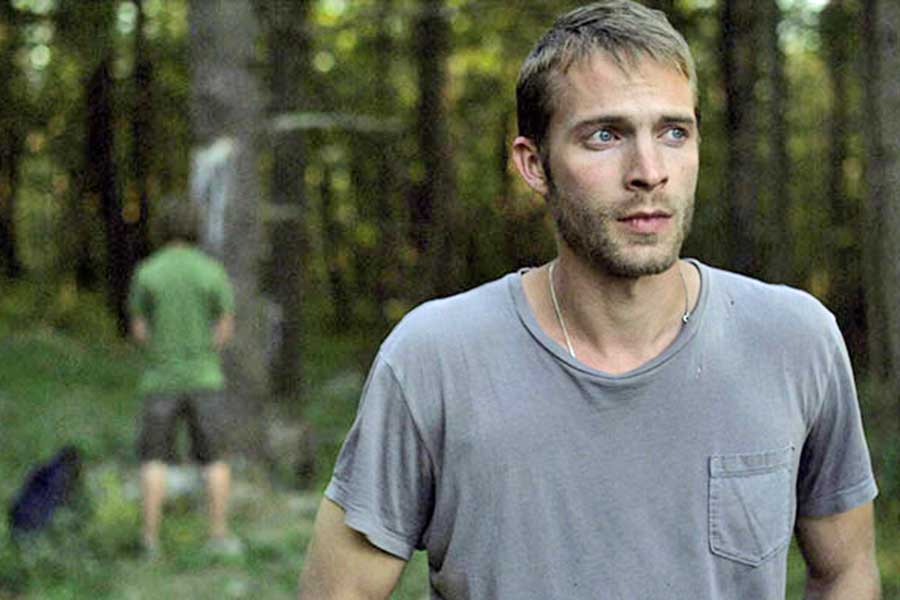Out filmmaker and Temple University film professor Lauren Wolkstein co-directed the fantastic and hypnotic drama “The Strange Ones” with Christopher Radcliff. The film, based on the co-directors’ 2011 short of the same name, is currently on DIRECTV and will be available on iTunes Jan 5.
The story concerns two brothers (Alex Pettyfer and James Freedson-Jackson) driving to a cabin in the woods to go camping. As they meet a series of strangers, nagging questions arise: Are they actually brothers? Is one of them gay? And what are their real names? The filmmakers deliberately keep some, if not all, of the information a secret before the denouement, which may jolt viewers.
In a Skype session, Wolkstein explained that she met Radcliff at Columbia University. It was at film school where she became inspired to teach. Wolkstein started teaching senior projects and scene and script analysis at Temple four years ago. She divides her time between Philadelphia and Brooklyn, where she lives with her wife.
Wolkstein and Radcliff made their hypnotic short “The Strange Ones” seven years ago and had no intention of turning it into a feature back then.
“The success of the short was that we had a backstory based on an amalgam of several true crimes,” Wolkstein said. “We focused [the short] on this one moment when these two characters stumble across a motel clerk and how her relationship with who they are changes over the film’s 15 minutes.”
The deliciously intriguing, ambiguous short laid the groundwork for the feature.
“The fun of watching the [short] is that it asks the audience to determine who these characters are — like the clerk does,” Wolkstein said. “We could experiment with perspective in the short. A feature isn’t able to do that.”
Wolkstein, who was taught that subjectivity comes through character, breaks the rules of perspective by having viewers constantly recalibrate what they know (or think they know) about the characters and their situations.
“With filmmaking, you’re creating something that doesn’t have all the answers, and spoon-feeding the audience what to feel and think is talking down to them. That’s not realistic. You have a responsibility as a filmmaker to trust the audience to bring their own experiences to it. Grasping and grappling with identity is something filmmaking allows you to explore.”
Grasping and grappling with identity is something the film’s characters explore as well. The younger boy (Freedson-Jackson’s character), the filmmaker acknowledged, “is haunted by images and things in his past. He is dealing with trauma and trying to find a way to survive. He sees this older man [Pettyfer’s character] as a protector. He is at a transitional stage in his life grappling with identity and sexuality. He’s looking for something … ” His voice trailed off, alluding that something might be hanging in the air.
Wolkstein admitted that she wanted to “queer things up” but insists “The Strange Ones” is “not a gay film.”
“The main character may or may not be gay. The ambiguity is fascinating. Our goal was to create multiple interpretations to every scene so the audience can create their own experience. It was playing with desire and hate and that dichotomy between those feelings.”
How the story unfolds and what is revealed about the characters is absolutely best left for viewers to discover and debate. “The Strange Ones” is remarkable because the filmmakers are fantastic storytellers. They use an eerie flute on the soundtrack to create tonal dissonance and shoot through windows or slow zooms that force viewers to lean into the frame looking for clues or answers.
“We wanted to have a strong visual motif,” Wolkstein said. “If you look deep, you can find meaning in the different patterns; they really bring something more to it in terms of folklore and creating this mythical fantasy — or surreality — to the piece. It was important to create that tone of mystery and ambiguity. The coffee cup and the washing machine are ordinary objects that are skewed. The black scribble and the cave are these voids.”
Another key to the film is how it plays with genre. “The Strange Ones” was never meant to be a “whodunit” story. It’s a road trip that is a mystery. It doesn’t use genre conventions; rather, it subverts tropes and emphasizes mood and atmosphere. Viewers will think about the central theme — you never really know anyone — long after the credits roll, which prompts the question: What is something people might not otherwise know about Wolkstein?
“That I am obsessed in poker,” the filmmaker responded. “I’m not that good, but it’s fascinating to be around the table.
“My next movie is about a female poker player,” Wolkstein added. “You can understand people in a different way by watching their faces and little gestures and tells. It’s a game about skill and mental agility and really being able to use psychology [and] math as well as luck. But there is a kind of reinvention in showing up at a poker table and being whoever you want to be.”
